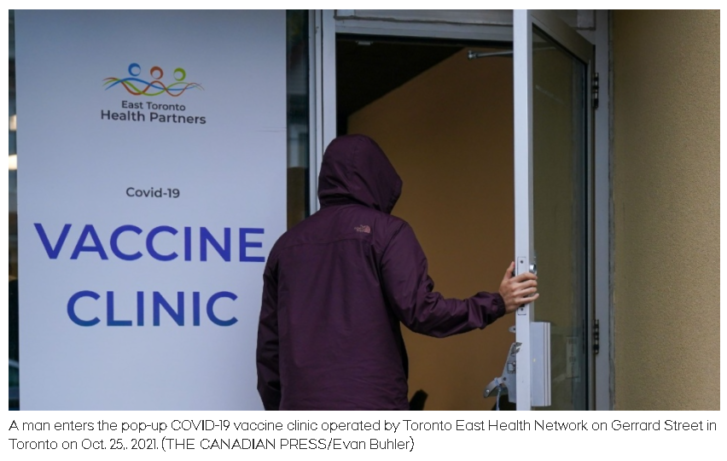As provinces and territories work to inoculate their populations against COVID-19, questions are swirling over whether booster shots will soon be required for individuals to be considered “fully vaccinated.”
In October, Israel announced that those with two doses of a COVID-19 shot would not be considered “fully vaccinated” unless they got a third jab.
What’s more, last month, French President Emmanuel Macron announced people 65 and over would need to present proof of a COVID-19 booster shot by mid-December in order to receive their vaccination passport.
Currently, booster shots are not required in Canada to receive a vaccination passport, but campaigns are underway across the country to offer third doses to those most vulnerable to the disease.

Dr. Nazeem Muhajarine is an epidemiologist in Saskatoon, Saskatchewan.
Asked by CTV’s Your Morning whether booster shots could become a requirement in Canada in order to be considered fully vaccinated, Muhajarine said it is an “evolving situation.”
He said the reason both Israel and France are now requiring booster shots in order for residents to considered fully vaccinated is because they began offering the third doses earlier than Canada.
“So they have had a long experience in boosting their population compared to Canada,” he explained. “That being said, I think, you know, give it two, three months, I can’t see how we will not follow a similar approach to Israel, and that is people who are eligible to get a third shot and completed that would be considered fully vaccinated at that time.”
However, Muhajarine said that won’t happen for a while.
“I think because there is a wide variety of ways that provinces [are] introducing their booster eligibility,” he said.
Muhajarine pointed to Saskatchewan which lowered its booster eligibility age to 50 on Tuesday.
Officials in the province announced COVID-19 boosters would be available for healthcare workers and residents 50 and older in Saskatchewan, and to anyone 18 or older who is living in the far north or in First Nations communities.
Researchers have found that the immunity from two doses of a COVID-19 vaccine wanes over time, meaning Canadians will require another dose to “boost” their immunity to the virus.
Asked whether the public will need booster shots every six months for the foreseeable future, Muhajarine said “I would think so.”
He said the growing consensus is that COVID-19 is “here to stay with us for a while.”
“And it will, kind of revolve into endemic situation meaning, low incidence or prevalence of this COVID-19, and it will become like a seasonal flu, hopefully,” he said. “And so, in order to actually protect ourselves, we would probably need to boost our immune system, seasonally speaking even from time to time.”
He said that is “probably the direction we are headed right now.”
WHAT HAS NACI SAID?
The National Advisory Committee for Immunization (NACI) released updated guidance last week, outlining several sections of the Canadian population that it said should receive a booster shot at least six months after having had their primary vaccine series.
NACI said it “strongly recommends” an mRNA booster shot be offered to those over 50, seniors living in long-term care homes and other congregate living facilities, and to those who received a viral vector COVID-19 vaccine series such as AstraZeneca or Johnson & Johnson.
The committee also said it strongly recommends First Nations, Inuit and Metis peoples and frontline healthcare workers should also be provided a booster shot.
NACI has also recommended booster doses for those between the ages of 18 and 49, at least six months after they received their primary vaccine series.
While NACI issues guidance and recommendations, it is ultimately up to provinces and territories to decide how vaccine rollout will work within their jurisdiction.
Article From: CTV news

